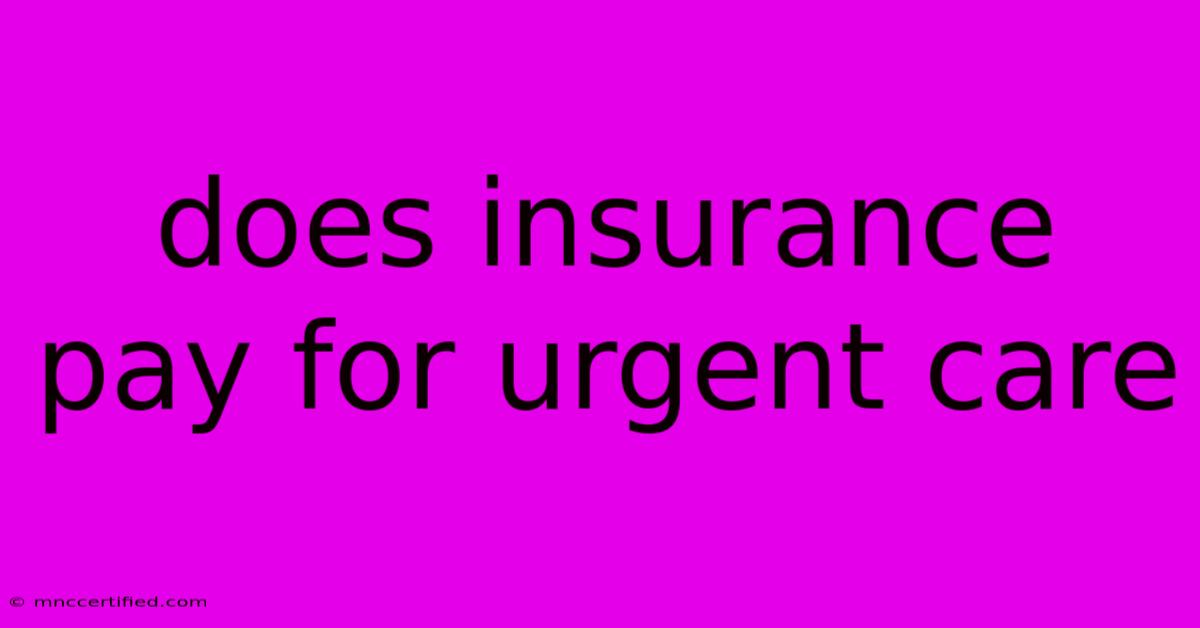Does Insurance Pay For Urgent Care

Table of Contents
Does Insurance Pay for Urgent Care? A Comprehensive Guide
Urgent care visits can be a lifesaver when you need immediate medical attention but don't require a trip to the emergency room. But a common question arises: does my insurance pay for urgent care? The answer, unfortunately, isn't a simple yes or no. It depends on several factors, and understanding these nuances is crucial to avoiding unexpected medical bills.
Understanding Your Insurance Plan
The key to determining whether your insurance covers urgent care lies in understanding the specifics of your health insurance plan. Different plans offer varying levels of coverage, and the details are often buried within lengthy policy documents. Here's what to look for:
1. Network Providers:
Most insurance plans operate on a network system. This means they have agreements with specific doctors, hospitals, and urgent care centers. Visiting an in-network urgent care facility is essential for maximizing your insurance coverage. Out-of-network visits typically result in significantly higher out-of-pocket costs. Always verify that the urgent care clinic is in your insurance network before your visit. You can usually find this information on your insurance company's website or by contacting their customer service.
2. Copay, Coinsurance, and Deductible:
Even if the urgent care is in-network, you'll likely still have to pay some amount out-of-pocket. This could include:
- Copay: A fixed fee you pay at the time of service.
- Coinsurance: A percentage of the bill you pay after meeting your deductible.
- Deductible: The amount you must pay out-of-pocket before your insurance coverage kicks in.
These amounts vary drastically depending on your specific plan. Check your policy documents or your insurer's website for precise details regarding your copay, coinsurance, and deductible for urgent care visits.
3. Plan Type (HMO, PPO, POS):
The type of health insurance plan you have influences coverage.
- HMO (Health Maintenance Organization): Typically requires you to see primary care physicians (PCPs) first for referrals to specialists and urgent care.
- PPO (Preferred Provider Organization): Generally offers more flexibility, allowing you to see specialists without referrals and potentially visit out-of-network providers (though at a higher cost).
- POS (Point of Service): Combines elements of HMO and PPO plans, offering a balance between cost and flexibility.
Understanding your plan type will help you navigate the process more effectively.
4. Pre-authorization:
Some insurance plans might require pre-authorization for urgent care visits. This means you need to contact your insurer before your visit to get approval for coverage. While less common for urgent care than for more specialized procedures, it's always wise to check your policy's requirements.
What if I Go Out-of-Network?
Visiting an out-of-network urgent care center can lead to substantially higher costs. You might be responsible for a larger portion of the bill, or even the entire cost, depending on your plan. While emergencies supersede planning, always try your best to find an in-network urgent care facility whenever possible.
Tips for Minimizing Costs:
- Check your insurance card and policy details before your visit. This will help you understand your coverage and what to expect.
- Confirm the urgent care center is in-network. A quick phone call can save you a significant amount of money.
- Ask about the expected cost upfront. Urgent care centers should be able to provide an estimate.
- Keep records of all medical bills and insurance claims. This will help you track your payments and ensure accurate billing.
- Consider using a telehealth service for non-emergency situations. Telehealth can often be a more affordable option.
Conclusion:
While insurance generally covers urgent care visits, the specifics depend heavily on your individual insurance plan. Proactive research and careful planning are essential for minimizing out-of-pocket expenses. By understanding your plan’s details and choosing in-network providers, you can ensure a smoother and more financially manageable healthcare experience. Remember to always contact your insurance provider if you have any questions or concerns about your coverage.

Thank you for visiting our website wich cover about Does Insurance Pay For Urgent Care. We hope the information provided has been useful to you. Feel free to contact us if you have any questions or need further assistance. See you next time and dont miss to bookmark.
Featured Posts
-
Texas Vs Arkansas Live Game Score
Nov 17, 2024
-
United Home Insurance Phone Number
Nov 17, 2024
-
Carpenters La Guest Christina Aguilera
Nov 17, 2024
-
No Head Coaching Interest For Sanders
Nov 17, 2024
-
No 2 Ohio State Northwestern Live Stream
Nov 17, 2024